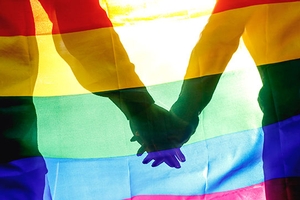Research
Elizabeth Suhay’s New Research Examines Attitudes on Gay Rights

Antigay activists tend to argue that sexual orientation is a choice, believing that persuading people this is true will convince them homosexuality is wrong. At the same time, gay rights advocates argue just the opposite — that sexual orientation is in part innate — hoping that if people accept this fact, tolerance toward LGBTQ people will increase.
But does changing a person's mind about the origins of sexual orientation actually influence a person's attitudes toward members of the LGBTQ community or the policies that affect them?
A new study by AU School of Public Affairs Assistant Professor Elizabeth Suhay suggests that giving people information about why some people are gay does not change how people feel — they either still support or disapprove of people of other sexual orientations, depending on the ideological lens they had going into the experiment. The article — "Science, Sexuality, and Civil Rights: Does Information on the Causes of Sexual Orientation Change Attitudes?" — was published recently online in the Journal of Politics.
Suhay's coauthor is Jeremiah Garretson, assistant professor of political science at California State University, East Bay, and author of the book "The Path to Gay Rights: How Activism and Coming Out Changed Public Opinion," forthcoming from NYU Press in June.
Public opinion data tends to suggest that people who have the most positive attitudes toward gay men and lesbians also are much more likely than others to believe a person's sexual orientation is innate, that is, present at birth. But "correlation is not causation," as the saying goes. Suhay and Garretson wanted to examine the link more closely to see if receiving scientific information on the origins of sexual orientation would cause a person to be more or less supportive of gay rights. No previous researchers had tested this relationship experimentally with a large, representative sample of U.S. citizens.
The researchers randomly assigned participants to receive one-sided information that sexual orientation was either the result of a person's biology or upbringing and personal choices. Another group of participants received no information.
The authors found that the information was somewhat able to influence people's factual beliefs about the origins of sexual orientation. However, whether people were persuaded by the information provided was tied up with their political ideology. "Self-identified liberals were more likely to be convinced by the biology treatment, and people who identified as conservatives were more likely to be convinced by the other treatment — so there was some biased reception of the evidence," said Suhay.
The bottom line is that the participants attitudes about gay rights did not change, even though some people changed their minds about the underlying causes of sexual orientation. To confirm this null result, Suhay said the research design measured support for gay rights in three ways — attitudes toward civil rights policies (such as gay marriage), opinions about whether homosexuality was morally acceptable, and finally, feelings toward the gay community. With each measure, no attitude change was evident.
"There was change in [factual] beliefs over time but not in attitudes," said Suhay. "We were somewhat surprised at first, but people have very strong opinions, and if they are prejudiced toward a group or feel warmly toward a group, it's not easy to change that."
Suhay said the study should be replicated, but if the findings hold, it could have implications for activists.
"Arguing over the science of something like sexuality is not an effective communications strategy," said Suhay.
To make the case for gay rights, activists should follow better established methods to change opinions, such as telling people that members of their peer groups support gay rights or advocating for more positive depictions of people from the LGBTQ community in the media.

